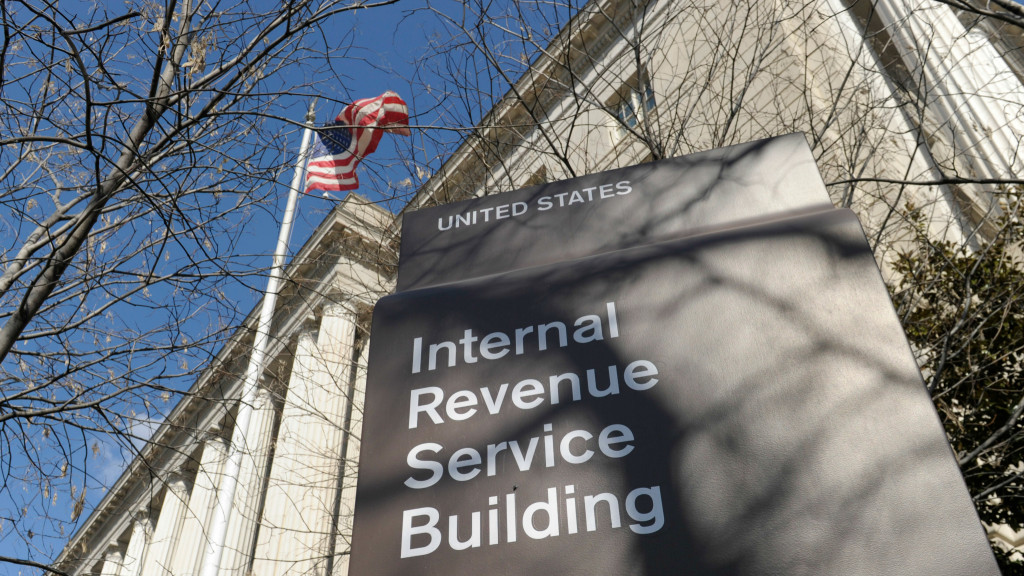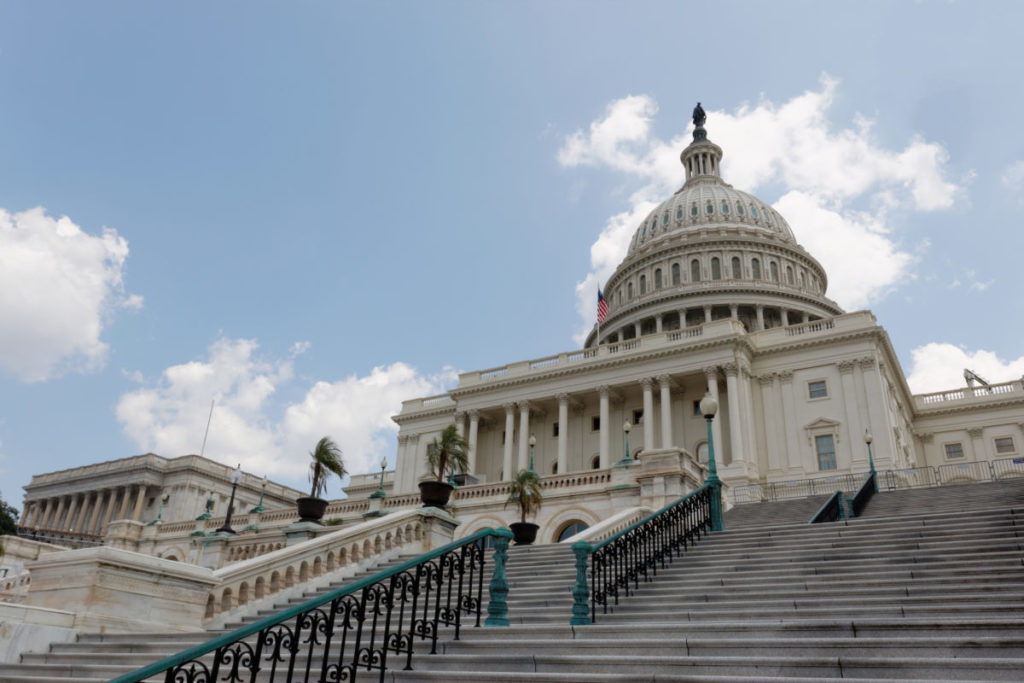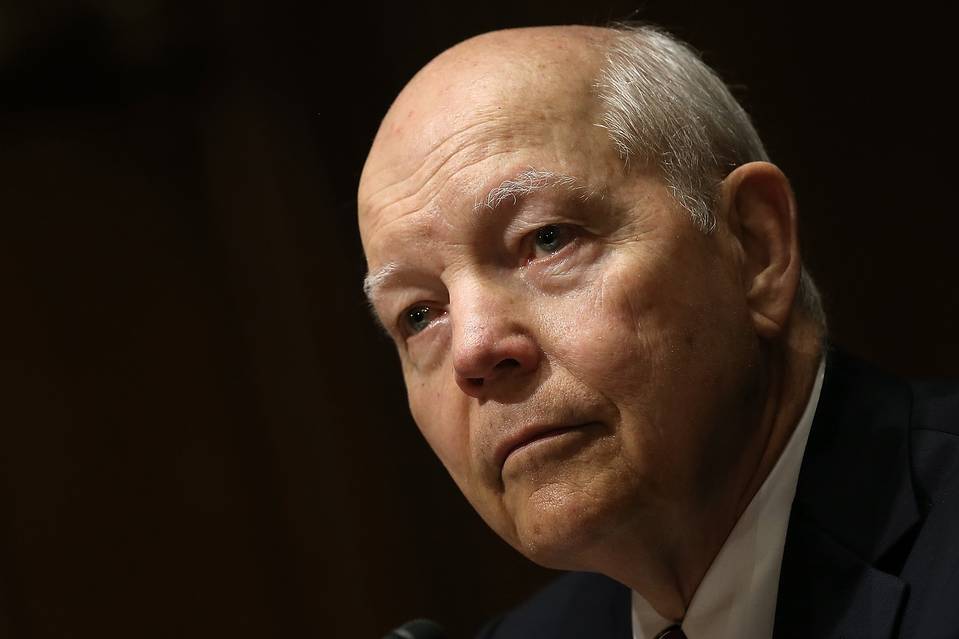Donald Trump’s charity admits violating IRS’ self-dealing ban

President-elect Donald Trump‘s charity has admitted that it violated IRS regulations barring it from using its money or assets to benefit Trump, his family, his companies or substantial contributors to the foundation. According to a 2015 tax return posted on the nonprofit monitoring website GuideStar, the Donald J. Trump Foundation acknowledged that it used money or assets in violation of the regulations not only during 2015, but in prior years. The tax filing, first reported Tuesday by The Washington Post, doesn’t provide details on the violations. The filing’s release comes as the New York attorney general’s office investigates whether Trump personally benefited from the foundation’s spending, including several purchases detailed in reports by The Post. Questions sent via email to Trump’s transition team weren’t immediately answered Tuesday. The foundation’s admission in the tax filing isn’t the first time it has run afoul of laws and regulations governing charitable organizations. In October, the office of New York Attorney General Eric Schneiderman, a Democrat, ordered the foundation to stop soliciting donations after it was discovered that the charity had been accepting outside contributions without the proper New York state registration. The foundation also gave an improper $25,000 check to a political committee supporting Florida Attorney General Pam Bondi in 2013. Charities are barred from engaging in political activities, and the president-elect’s staff says the check he signed was mistakenly issued following a series of inexplicable clerical errors. Earlier this year, the Trump Foundation paid a $2,500 fine to the IRS over the check. Trump had intended to use personal funds to support Bondi’s re-election, his campaign said. At the time, Bondi’s office was fielding media questions about whether she would follow the lead of Schneiderman, who had filed a lawsuit against Trump University and Trump Institute. Scores of former students say they were scammed by Trump’s namesake get-rich-quick seminars in real estate. Bondi, who the AP reported in June personally solicited the $25,000 check from Trump, took no action against Trump University. Trump last week settled three lawsuits over Trump University days before the scheduled start of a fraud trial in California, agreeing to pay out $25 million with no admission of wrongdoing. Bondi, meanwhile, met with Trump in Manhattan last week and appears to be under consideration for an appointment in the Trump administration. Republished with permission of the Associated Press.
House vote on impeaching IRS chief possible next week

The House will vote as early as next week on a conservative effort to impeach IRS chief John Koskinen. But congressional GOP leaders still must decide how to avert a federal shutdown and finance federal efforts to contain the Zika virus, even as the approaching elections pressure them to avoid riling voters. After House Republicans met privately Wednesday for the first time since Congress returned from summer recess, leaders said GOP lawmakers would meet again next week to discuss their next steps on Koskinen’s impeachment. They said a House vote would come sometime after that. Conservatives have pushed for Koskinen’s removal since last year, saying he’s impeded their investigation of how the IRS treated tea party groups several years ago – before he led the agency. Others worry that with the effort certain to fail in the Senate should it get that far, it needlessly risks making the GOP look too partisan just before voters go to the polls. “Members are going to vote the way they want to vote on this,” House Speaker Paul Ryan, R-Wis., told reporters. But he added, “You have members on both sides of this.” The impeachment drive has prompted little enthusiasm among GOP leaders and is solidly opposed by Democrats. Even if the House votes to impeach Koskinen – the equivalent of formally charging him with a crime – the move is certain to go nowhere in the Senate, which has final say on removing an official from office. A resolution introduced by conservatives accuses Koskinen of not cooperating with congressional subpoenas for documents and making false statements to Congress about destroyed emails in the probe. Koskinen has said the charges are without substance. Republican leaders hope to resolve that and other issues and send Congress home by September’s end so lawmakers can campaign. In a post-summer fixture for Congress, Republicans and Democrats remain divided over federal expenditures. Lawmakers have a long way to go to complete spending legislation to keep agencies functioning after Sept. 30. With zero chance of completing all 12 spending bills by then, the key questions are how many weeks a temporary spending package will last, and whether the GOP can garner enough votes for such a measure without triggering a government shutdown sure to enrage voters. Many conservatives want to provide temporary spending into early next year, instead of extending it only into December. They don’t want to let a post-election, lame duck session of Congress make the year’s spending decisions because they say retiring lawmakers who no longer must face voters are more inclined to accept wasteful spending. President Barack Obama and Senate Democrat oppose that idea. Even House Speaker Paul Ryan, R-Wis., has said he wants to keep negotiating into the fall on full-year spending measures. “I’m sure we’ll have a successful outcome to make sure just that the trains are running on time,” Ryan told hometown radio host Stan Milam of AM 1380 in Janesville, Wisconsin, on Tuesday. Some conservatives said Wednesday they might support a short-term spending bill into December in exchange for language blocking money to resettle Syrian refugees in the United States, language opposed by most Democrats. Late Tuesday, the Senate used its first vote since returning to recess to highlight that partisan battling over financing the battle against Zika remains as bitter as ever. For the third time this year, Senate Democrats blocked a Republican measure to battle the virus. A 52-46 vote to advance the money fell short of the 60 votes needed as Democrats opposed provisions blocking Zika prevention and treatment money from going to Planned Parenthood clinics in Puerto Rico. Republicans called that a shaky excuse compared to the threat of the mosquito-carried Zika virus. No. 3 Senate Democratic leader Chuck Schumer of New York said the GOP was using the bill “to assuage the hard right.” There have been dozens of Zika cases in the political battleground state of Florida. Tuesday’s vote could prod Republicans to attach Zika money to temporary spending legislation. Part of the spending fight is over the Pentagon. Republicans want to use emergency war funds to artificially increase the basic defense budget by $16 billion next year. The Obama administration and its Democratic allies oppose the idea, saying if Republicans want more money for defense, domestic programs will have to receive an equal boost. Senate Democrats also blocked that measure from advancing Tuesday. Republished with permission of the Associated Press.
IRS taps Alabama Revenue Commissioner for Advisory Committee

The Internal Revenue Service on Wednesday announced the selection of Alabama Revenue Commissioner Julie Magee for the Electronic Tax Administration Advisory Committee (ETAAC). Established in 1998 to provide an organized public forum for discussion of electronic tax administration issues, including preventing identity theft and refund fraud, the committee supports the overriding goal that paperless filing should be the preferred and most convenient method of filing returns. “Commissioner Magee has been an outstanding administrator of the Alabama Department of Revenue,” Alabama Gov. Robert Bentley said in a news release of Magee’s appointment. “She is a great choice to serve on this advisory committee. Her work shows her dedication to the people of Alabama and the security of their private information. I know her work on this committee will be beneficial to our state and the country as a whole.” As state revenue commissioner, Magee is responsible for the operation and management of the Alabama Department of Revenue. “As the commissioner of revenue, it is my responsibility to help ensure taxpayers can easily file income tax returns while protecting the process from criminals seeking to steal taxpayers’ identities and treasury dollars,” Commissioner Magee said. “I am honored to be a part of the ongoing efforts started by Commissioner Koskinen and I believe we will be more successful in the future because of the work done by ETAAC.” ETAAC members will work closely with the Security Summit, a joint effort of the IRS, state tax administrators, and the tax software industry to fight electronic fraud. Commissioner Magee currently participates in the IRS Security Summit.
Alabama tax refunds could come late for half a million residents

Some households may find themselves waiting a little longer for their tax refunds next spring. Due to an IRS procedural change, households that file early and claim the Earned Income Tax Credit (EITC) or the Additional Child Tax Credit will not see their refunds until after Feb. 15. The Internal Revenue Service said the delays are the result of a new anti-fraud regulation that will take effect in 2017. The rule will give the agency more time to identify and eliminate fraud in both programs. These changes are a result of the passage of the Protecting Americans from Tax Hikes Act of 2015. While the majority of the law simply makes some temporary tax credits permanent, other portions of the bill attempt to crack down on what some investigators have called a “formula for fraud.” In 2014, 27.5 million Americans — and roughly 507,000 Alabamians — filed for the EITC. In Alabama, the EITC average return amount was $2,784, which came in above the national average of $2,400. ”This is an important change to be aware of for some taxpayers used to getting an early refund,” said IRS Commissioner John Koskinen. “We’ll be focusing on awareness of this change throughout the fall, but it’s important for taxpayers who might be affected by this to be aware of the change for their planning purposes. Although we still expect to issue most refunds within 21 days, we don’t want people caught by surprise if they get their refund a few weeks later than previous years.” The IRS usually issues refunds within 21 days or less after processing begins on a return. The agency began accepting returns Jan. 19 this year. “These increased security screenings are invisible to most taxpayers,” Koskinen continued. “But we want people to be aware we are taking additional steps to protect taxpayers from identity theft, and that sometimes means the real taxpayers face a slight delay in their refunds. As we continue improving our processes and working with the states and the tax industry, we will stop more fraud while also fine-tuning our tools to reduce the number of innocent taxpayers who might see a refund delay. “
Donald Trump says his business flourishing since presidential run

Donald Trump has told the government that his myriad businesses have flourished with rising revenues since his improbable political success, according to financial documents released Wednesday. The presumptive Republican presidential nominee said revenue at his businesses grew by $190 million over the past 17 months, and he had $557 million in earned income. The Federal Election Commission released the personal financial documents that Trump filed with the agency. They provide an overview of the billionaire’s assets and revenues and his roles with hundreds of corporate shell companies. Trump has so far declined to release his tax returns, making it difficult to confirm financial details. The 104-page filing provided little evidence that Trump’s combative campaign hurt his business prospects, despite regular talk of boycotts early in his campaign. Though the disclosure overlaps with one he filed last year — making straight comparisons difficult — revenues from his golf resort businesses are up, with Trump reporting $306 million in revenues from his courses around the world. About $132 million of that came from Trump’s course in Doral, Florida, up from $49 million in revenue the year before. The Mar-a-Lago club, a Trump vacation property and private club that has been a regular backdrop for campaign events, also saw a big jump. It reported $29 million in revenues, far more than the $16 million reported in Trump’s filing last year. The Miss Universe Pageant, which Trump sold after his comments on Mexican immigrants led to a dispute with television networks, went for $49 million. That was far more than the $5 million to $25 million the pageant was listed as worth on his financial disclosures from last year. Trump said late Tuesday that the filing was “the largest in the history of the FEC” and he praised the timely submission. Despite promising at various points during the campaign that he would release his tax returns, Trump has not yet done so. He has said audits by the IRS prevent him from doing so, and speculated that he was being singled out because of his strong Christian beliefs. IRS officials have not said whether they were auditing Trump. They have said Trump could publicly release his filings even if such an audit was occurring. Trump’s personal financial disclosure provides little hint that Trump is winding down his business ventures amid his presidential run. Trump reported new licensing and management companies with international names, including ones that appear to be set up to do business in Kolkata, India, Buenos Aires, Argentina, and Jeddah, Saudi Arabia. He also resigned from about one dozen companies since last year, most of which do not appear to have been active. Among them: companies tied to a failed Trump-branded condo project south of Tijuana, Mexico; a company tied to the Trump SoHo high-rise hotel in Manhattan; a licensing company associated with an Israeli vodka company; and a branding company set up to do business in Dubai, United Arab Emirates. Trump has said he would turn over the reins of his business to his children should he become president. Smaller but notable details of Trump’s business efforts include sales of “Crippled America,” his campaign book published last year. Trump reported that the book generated between $1 million and $5 million in income. The skin care line run by his wife, Melania, generated little or no revenue. The Trump Entrepreneur Initiative, the rebranded name of Trump University, a real estate seminar firm that has drawn multiple class action lawsuits and a suit by New York’s attorney general, reported $13,000 in income. Republished with permission of The Associated Press.
Mike Rogers: It’s time to rein in the Internal Revenue Service

On the heels of Tax Day 2016, the House of Representatives brought several bills to the Floor this week dealing with the Internal Revenue Service (IRS). With such a complicated tax code, most folks across East Alabama dread mid-April. The IRS hasn’t helped its credibility in recent years by choosing to target citizens based on their political beliefs while wasting money on conventions and bonuses. This week’s legislation represents just a few of the common-sense improvements we can make to the IRS. H.R. 4903 permanently bars the IRS from using any of its budget to target U.S. citizens for exercising their constitutional rights. It is very revealing about the motives of the Obama Administration that Congress would have to pass such a bill. The IRS Oversight While Eliminating Spending (OWES) Act, H.R. 4885, eliminates fee driven slush funds in the IRS’ budget and makes them subject to Congressional oversight. This change will stop the IRS from using fees on taxpayers to avoid restrictions on their budget. To deal with rogue employees of the IRS were two bills including H.R. 1206, the No Hires for the Delinquent IRS Act and H.R. 3724, the Ensuring Integrity in the IRS Workforce Act. The first piece of legislation prohibits the IRS from hiring new employees until the Treasury Department certifies that no IRS worker has serious tax delinquencies. The second bill prohibits the IRS from rehiring former employees who had been terminated from the IRS for misconduct. The IRS should hold its workers to the same standards it expects from taxpayers. Anyone who has had the misfortune of having to contact the IRS knows firsthand that customer service is not their forte. H.R. 4890, the Ban IRS Bonuses Until Customer Service Strategy is Developed Act, does just what the title says. The bill prohibits bonuses be paid to any IRS employees until the agency develops a comprehensive customer service strategy. I supported all of these bills because Americans deserve better than the bloated bureaucracy the IRS has become and I will continue to support legislation that forces the agency to do a better job. • • • Mike Rogers is a member of U.S. Congress representing Alabama’s 3rd Congressional District.
Tax time: More than 5M returns expected by midnight deadline

Millions of taxpayers were facing a midnight deadline to file their tax returns, while millions of others were asking for a six-month extension. The filing deadline on Monday was delayed three days beyond the traditional April 15 deadline because Friday was a legal holiday in the District of Columbia. Some things to know about taxes: THANK YOU, EMANCIPATION DAY The traditional April 15 filing deadline was extended because of Emancipation Day, a legal holiday in the nation’s capital. The holiday commemorates President Abraham Lincoln‘s signing of the District of Columbia Compensated Emancipation Act in 1862. The act freed more than 3,000 enslaved people in the district and compensated their owners. The Friday holiday moved the tax deadline to the next business day. In Massachusetts and Maine, taxpayers get one more day to file. The deadline there is Tuesday because Monday is a legal holiday, Patriots’ Day, in both states. The holiday commemorates the first battles of the Revolutionary War in 1775. When the federal deadline is moved back, state and local deadlines also move back to match it. ___ 150 MILLION TAX RETURNS The IRS said millions of tax returns are filed daily as the tax deadline approaches, with more than 5 million returns expected on Monday. More than 150 million tax returns are expected to be filed in 2016. Almost 82 million refunds were issued as of April 8, the IRS said. The average refund amount was $2,798. For those who needed more time to finish their returns, tax-filing extensions were available. The IRS reminds taxpayers that extensions grant more time to file returns, but do not extend time to pay. The IRS projects it will receive 13.5 million requests for extensions. ___ CONGRESS TARGETS IRS The IRS is a favorite target of lawmakers from both parties who complain about the complexity of the tax code and accompanying regulations that span more than 70,000 pages. Instructions to complete IRS Form 1040 — the main individual income-tax return — run more than 100 pages. House Speaker Paul Ryan, R-Wis., released a statement Monday outlining “three reasons why the IRS is failing” taxpayers. The agency has a leadership deficit, “a huge lack of transparency” and is implementing a tax code that is “way too complicated,” Ryan said. The GOP-led House will vote this week on a half-dozen bills to hold the IRS more accountable. One bill would require the IRS to crack down on employees who are delinquent on their own taxes. According to the agency’s inspector general, nearly 1,600 IRS employees have failed to pay their own taxes in the past decade. The House also will consider legislation that blocks the IRS from rehiring employees who were already fired by the agency for misconduct. It will vote on bills to ban IRS employees from getting bonus payments until the agency puts in place a plan to improve customer service, and to block any IRS funding from being used to target citizens for political purposes. The last bill is in response to complaints by Republicans that the tax agency unfairly treated conservative and tea party groups seeking tax-exempt status. The Justice Department said last fall that no IRS official will face criminal charges in the political controversy over the processing of applications by groups seeking tax-exempt status. Rep. Steny Hoyer of Maryland, the No. 2 Democrat in the House, said he was disappointed that House Republicans will bring bills to the floor that Hoyer said will make it harder for the IRS to do its work. Criticizing “hard-working federal employees simply because they are tasked with collecting Americans’ taxes is wrong,” said Hoyer, whose suburban Washington district includes thousands of federal workers. The fate of the IRS-related bills in the Senate is uncertain. ___ IMPEACH IRS COMMISSIONER? The House Oversight and Government Reform Committee has moved to impeach IRS Commissioner John Koskinen, but a full vote has not been taken in the House. Ryan said last week that “the IRS is not being led well,” but he stopped short of backing impeachment. The IRS “is an agency that needs to be cleaned up,” Ryan said, but instead of impeachment, Republicans need to win the presidential election to “get better people in these agencies and reform the tax code so we’re not harassing the average taxpayer with a tax code that they can’t even understand.” ___ CYBERSECURITY Ryan and other Republicans also criticize the IRS for failing to secure sensitive taxpayer data. They cite an inspector general’s report that identifies “significant security weaknesses that could affect the confidentiality, integrity and availability of financial and sensitive taxpayer data.” Koskinen told a House Science, Space and Technology subcommittee last week that securing taxpayer data continues to be a top priority. The IRS withstands more than one million malicious attempts to access its data each day, Koskinen said, and is stepping up efforts to combat identity theft. Even so, the problem is growing. What used to be limited to individuals filing a few dozen or a few hundred false tax returns now is often the work of organized crime syndicates in the U.S. and other countries, Koskinen said. The agency has “a delicate balance” to maintain, he said: “We need to keep the criminals out, while letting legitimate taxpayers in.” Republished with permission of the Associated Press.
Beware of tax-season scam artists

Jan. 19 marked the start of tax season, a time only looked forward to by big spending politicians, bureaucrats and fraudsters. With Tax Day less than three months away, folks across the country are scrambling to get their financial houses in order as they prepare to file with the IRS. Complicating an already stressful process is the increased threat of tax fraud, as a growing number of scammers and sophisticated hackers are hard at work trying to steal from unsuspecting tax filers. There have been 736,000 reports of fraudulent incidents of scammers calling taxpayers falsely claiming to be from the IRS. The phone scams started by targeting seniors and immigrants but have now expanded to targeting everyone in all 50 states. These phone scams have cost victims more than $23 million since 2013. Now scammers are posing as tax-filing services as well. Just this week, it was reported that scammers are sending emails, falsely appearing to be from TurboTax, that aim to steal personal information. If you receive such an email, delete it and don’t reply or forward it. Although some of the most common scam tactics use direct contact like phone and email, there are growing concerns over the use of technology and a lack of online security for taxpayers. Tax fraud from online tax programs is becoming a bigger and bigger problem. There are literally millions of online accounts that criminals can use to prey on legitimate taxpayers, stealing their identity and pocketing their hard-earned money. Everyone is at risk, especially seniors. In 2013 alone, swindlers succeeded in stealing $5.8 billion in fraudulent refunds on 1 million returns. When filing online, beware of services that do not have security measures to protect your identity. Whistle-blowers from Intuit/TurboTax have spoken out about the lack of security measures for online filers. In 2015, two former TurboTax employees came forward acknowledging that they had “found literally millions of accounts that were 100 percent used only for fraud,” and that TurboTax management “forbade” them from flagging or turning off the fraudulent accounts and refused to implement suggested security measures to stop the rampant fraud. Although tax scams don’t discriminate, unfortunately America’s seniors are among the most vulnerable for falling victim to fraud — having their identity stolen or personal security compromised during tax filing season. On behalf of 60 Plus, I encourage seniors and their loved ones to be on the lookout for unscrupulous individuals and companies who would put them and their personal information at risk.
How seniors can prevent rising online scams, identity theft during 2016 tax season

As April 15 quickly approaches and Americans start to file tax returns, a large number of people will be in for a shock. And it’s not a bigger-than-expected refund. Many will learn their taxes have already been filed – by someone else using their identity. Identity theft and tax fraud are on the rise in 2016, with an increasing number of fraudulent tax filings to the Internal Revenue Service through such popular online programs as TurboTax, H&R Block, and eFile. Con artists use information such as Social Security numbers to file taxes and get a job falsely – resulting in the IRS having inaccurate taxpayer income data. One such case was a 29-year-old Okeechobee woman who filed a report in January with the local Sheriff’s office after discovering a tax return was previously submitted in her name, giving the thieves a refund of $1,500. According to the IRS, there were nearly 736,000 reports of fraudulent contacts since 2013, a majority of those by scammers posing as IRS agents. Phone rip-offs have cost taxpayers more than $23 million, the agency says. With more taxpayers turning to the Internet to file taxes quickly and easily, the problem of identity theft is far from a minor nuisance. The IRS estimates it prevented $24.2 billion in identity theft in 2013; a report by the U.S. Government Accountability Office shows the IRS still paid $5.8 billion in fraudulent refunds, up from $3.6 billion the year before. Seniors and immigrants are particularly vulnerable to identity theft, IRS officials say. Usually, the scam begins with a call to victims asking for Social Security numbers. “Callers claim to be employees of the IRS, but are not,” the IRS website advises. “These con artists can sound convincing when they call. They use fake names and bogus IRS identification badge numbers. They may know a lot about their targets, and they usually alter the caller ID to make it look like the IRS is calling.” In a recent Context Florida op-ed, Apryl Marie Fogel of the 60 Plus Association, a nonpartisan senior advocacy group, warns that the use of technology and a lack of online security will only increase the problem. “There are literally millions of online accounts that criminals can use to prey on legitimate taxpayers, stealing their identity and pocketing their hard-earned money,” she writes. “Everyone is at risk, especially seniors.” As an example, Fogel points to the 2015 instance of two former TurboTax employees who acknowledged the existence of accounts that “were 100 percent used only for fraud.” The pair accused TurboTax management of “forbidding” either flagging or turning off the fake accounts while refusing to implement security measures to stop widespread fraud. In Florida, Attorney Gen. Pam Bondi’s office released a checklist to help safeguard taxpayers from fraud and identity theft: File tax returns early; Research tax preparers thoroughly before providing personal information; When filing electronically, Use a secure Internet connection. Do not use unsecured, publicly available Wi-Fi hot spots; Mail tax returns directly from the post office, not from home; Many taxpayers are eligible for an Identity Protection PIN from the IRS. Should someone enrolled in the IRS IP PIN program and file a return with an incorrect PIN, the IRS will reject or delay the return until submitted with the correct PIN and the taxpayer’s identity is confirmed. To obtain an IRS IP PIN IRS.gov; The IRS will never initiate contact by email, phone, text or social media. If the IRS needs information, it will first contact by mail; and If a Social Security number has been compromised, contact the IRS ID Theft Protection Specialized Unit at (800) 908-4490. Also, the 60 Plus Association issued a news alert/fact sheet with tips, precautions and things to keep in mind to avoid being scammed, which includes information about the IRS services available for seniors and others with low incomes. 60 Plus also provides an online resource with more information geared toward older adults: www.60Plus.org/StopIRSScams.
U.S. Treasury Department issues health law reporting extension for employers

The Treasury Department on Monday gave employers an extension of critical reporting requirements, as it seeks to manage some of the most complicated parts of the federal health care law. Employers had previously faced deadlines in February and March to report 2015 health insurance information to their employees, and also to the IRS. If they need more time, employers can now have until March 31 to get information to their workers and until June 30 in certain cases to get details to the IRS. Treasury said it acted after many employers complained they might not be able to get the information processed in time. Companies that rely on outside vendors were running into a bottleneck. “It’s a limited extension to make the system work as smoothly as possible,” said Treasury senior adviser Mark Iwry. The extension also applies to health insurance companies facing similar reporting requirements. The information is needed to enforce the health law’s requirement that individuals carry insurance, to administer its subsidies for premiums and to apply its requirement that larger employers offer coverage. Employers and insurers are filing the annual reports for the first time, as required by the health law. President Barack Obama‘s health care overhaul joined health insurance and taxes, two of the most complicated areas for consumers and employers alike. The law’s penalties for people who go without health insurance are administered through the income tax system, as are its subsidies to people who qualify for assistance with their premiums. Penalties for larger companies that fail to provide coverage are also assessed through taxes. The requirement for employers with 50 or more workers to offer coverage or face fines has been delayed twice. It takes effect Jan. 1 for companies with 50-99 employees. Companies with 100 or more workers faced the requirement starting this year, after an initial postponement of a year. Treasury officials said that Monday’s announcement does not involve any more delays of the law’s underlying requirements, and just provides additional time for companies to file paperwork. Republished with permission of the Associated Press.
Bradley Byrne: Standing up for Small Business

With the Thanksgiving holiday behind us, the hustle and bustle of the Christmas season has officially started. From shopping for presents to finalizing your travel plans, the next few weeks are sure to be busy. Many of you likely tried to get a head start on shopping last Friday, but did you know that Saturday was also a special day for shopping? Last Saturday marked Small Business Saturday. This is a day set aside to support our nation’s small businesses and to highlight the vital impact they have on our economy. Small Business Saturday is a relatively new tradition, but it has really taken off over the last few years. Since our nation’s founding, entrepreneurs and innovators have built our economy up through small businesses. These small businesses are very important to our economy. In fact, half of all working Americans who have a job in the private sector are working at a small business. From boutique clothing stores to ship repair companies to candle shops, Southwest Alabama is home to a wide range of small businesses. During my time in Congress, I have made it a top priority to visit these businesses in Southwest Alabama to learn more about the challenges they face. Sadly, I quickly realized that small businesses are drowning in costly regulations and a confusing maze of red tape. Since 2008, more small businesses have closed than have opened. That’s why I have made it a priority over the last two years to push for legislation that cuts back regulations, gets Washington out of the way, and allows small businesses to flourish. For example, the tax code is far too confusing and complicated for our small businesses. I believe we should simplify the tax code and make it easier for all Americans. It shouldn’t require countless hours and hundreds of dollars to do your taxes each year. A fairer, simpler tax code would go a long way toward getting the federal government off the back of our small businesses. The Internal Revenue Service (IRS) isn’t the only federal agency making life harder for small businesses. There is also the Occupational Safety and Health Administration (OHSA), which puts excessive compliance requirements on small businesses that simply don’t make sense. Regulations from the Environmental Protection Agency (EPA) are also driving up energy costs and making it harder for small businesses to get ahead. It seems like every day the Obama Administration is putting out a new, costly regulation. In the House, we have an entire committee devoted to fighting back against these regulations and supporting our nation’s small businesses. Chairman Steve Chabot (R-OH) and the House Small Business Committee work diligently to advance legislation designed to make life easier for our small businesses. This year alone, the House has passed a number of bills designed to support small business. In February, the House passed H.R. 527, the Small Business Regulatory Flexibility Improvements Act. This bill would require the federal government to conduct detailed cost analysis of proposed regulations and ensure small businesses have input before regulations are released. Another example of a House-passed small business bill is the Small Business Investment Company Capital Act of 2015, which would boost the Small Business Investment Company (SBIC). The SBIC is a public-private partnership that helps new small businesses gain access to equity and financing. In Congress, I am committed to being an outspoken advocate for small businesses as we work to get Washington bureaucrats out of the way. You can also do your part. As you check items off your Christmas list, don’t forget to spend time shopping at small businesses in your local community. They are the real backbone of our economy. Bradley Byrne is a member of the U.S. Congress representing Alabama’s 1st Congressional District.
Gary Palmer joins resolution to impeach IRS Commissioner John Koskinen

Alabama Congressman Gary Palmer (AL-06) and 18 other Republican members of the House Oversight and Government Reform Committee introduced a resolution Tuesday to start impeachment proceedings against IRS Commissioner John Koskinen. “Mr. Koskinen has repeatedly provided misleading testimony to Congress and has failed to comply with a Congressional subpoena,” said Rep. Palmer. “This behavior is unacceptable, particularly for someone in such a powerful position.” In introducing the resolution, House Oversight and Government Reform Committee Chairman Rep. Jason Chaffetz (R-UT) said, “Commissioner Koskinen violated the public trust. He failed to comply with a congressionally issued subpoena, documents were destroyed on his watch, and the public was consistently misled. Impeachment is the appropriate tool to restore public confidence in the IRS and to protect the institutional interests of Congress. This action will demonstrate to the American people that the IRS is under repair, and signal that Executive Branch officials who violate the public trust will be held accountable.” According to the Committee’s press release, Commissioner Koskinen violated the public trust in the following ways: Failed to comply with a subpoena resulting in destruction of key evidence. Commissioner Koskinen failed to locate and preserve IRS records in accordance with a congressional subpoena and an internal preservation order. The IRS erased 422 backup tapes containing as many as 24,000 of Lois Lerner’s emails – key pieces of evidence that were destroyed on Koskinen’s watch. Failed to testify truthfully and provided false and misleading information. Commissioner Koskinen testified the IRS turned over all emails relevant to the congressional investigation, including all of Ms. Lerner’s emails. When the agency determined Ms. Lerner’s emails were missing, Commissioner Koskinen testified the emails were unrecoverable. These statements were false. Failed to notify Congress that key evidence was missing. The IRS knew Lois Lerner’s emails were missing in February 2014. In fact, they were not missing; the IRS destroyed the emails on March 4, 2014. The IRS did not notify Congress the emails were missing until June 2014 – four months later, and well after the White House and the Treasury Department were notified. Before going the impeachment route, Palmer along with 51 members of Congress, called on President Barack Obama to remove Commissioner Koskinen back in July. The White House failed to respond to their request.


